The Unified Payment Interface (UPI), rolled out in 2016, and Immediate Payment Service (IMPS), launched in 2010, are instant fund transfer systems. UPI’s transaction volume rose from 12,203.02 million in January 2024 to 15,041.75 million in September 2024. The average daily transaction volume rose from 393.65 million in January to 501.39 million in September 2024. On the other hand, IMPS’s monthly transaction volume reduced from 508.79 million in January 2024 to 429.93 million in September this year. However, the number of IMPS member banks has increased from 845 in January 2024 to 902 in September 2024, offering IMPS access through mobile apps, internet banking, SMS, ATM, and branch banking.
However, here’s how the two systems differ:
Transaction Limit
For UPI transfers, banks cap the daily limit to Rs 1 lakh. However, for transactions like income tax, it can go up to Rs 5 lakh. In contrast, the daily transaction limit for IMPS is Rs 5 lakh.
The Fund Transfer Method
The IMPS fund transfer method is the same as the Real Time Gross Settlement (RTGS) and National Electronic Fund Transfer (NEFT). The remitter must have the receiver’s details such as name, bank name, account number, branch name, and IFSC code to transfer the money. In UPI fund transfer, the remitter only needs the receiver’s virtual address.
Ease Of Use
The IMPS process can be time-consuming compared to UPI as it requires in putting all necessary details of the receiver to execute the transfer. The UPI fund transfer process is relatively simple as it requires only the receiver’s virtual address and no prior registration is required to transfer money. UPI also supports QR code-based payments, making it easier for users.
Transaction Cost
IMPS’ transaction cost is slightly higher than UPI. For example, the HDFC Bank’s charges up to Rs 15 plus tax, as per its website. These differ from one bank to another. UPI transactions are mostly free or have minimal charges.
According to the Axis Bank website, an interchange fee may apply to merchants and businesses in UPI but not for individual customers. While paying via a prepaid payment instrument (PPI) linked to UPI, the merchant may have to pay a fee to the payment service provider. This fee, it
says, “is not directly passed to customers in most cases.” PPIs are like prepaid cards or wallets where one can preload the amount for transactions.
Two-Factor Authentication
IMPS do not require a two-factor authentication. A user can transfer the money to another party via IMPS by entering the MPIN. In the case of UPI, it has a two-factor authentication.
Linking Of Multiple Accounts
For IMPS transfers via apps, the customer must have access to the specific bank’s app. On the other hand, UPI allows access to multiple UPI IDs of different bank accounts via a single app.
Which Is More Suitable For You?
Kunal Verma, CEO and Co-Founder, Freo, a digital banking platform provider, “UPI transactions are free for consumers, which makes it an attractive option for everyday use. On the other hand, IMPS may incur charges that range from Rs 2.5 to Rs 15 plus GST for transactions up to Rs 2 lakh. For larger transactions, the fees can increase further. This cost disparity makes UPI a preferred choice over IMPS for smaller payments.”
So, it depends on the user comfort and requirement. Although IMPS charges are higher, it offers a higher daily fund transfer limit. The remitter can also complete the fund transfer via SMS, provided the person has the beneficiary’s Mobile Money Identifier (MMID). However, if the transaction amount is up to Rs 1 lakh, UPI could be more convenient. However, both the fund transfer methods are secure and instant, providing convenience to users.














